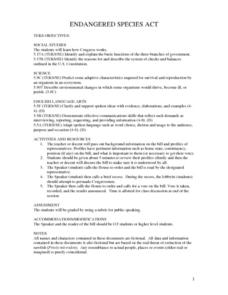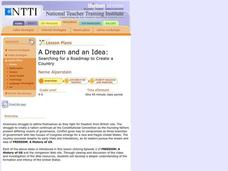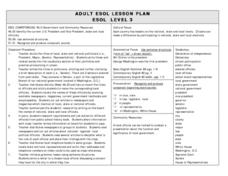Curated OER
Who Gets the Job?
Students explore the process for presedential Cabinet appointments. They determine common characteristics found in members of the Cabinet.
Curated OER
Endangered Species Act
Students spend the duration of this instructional activity examining the text of the Endangered Species Act. Individually, they complete a profile to determine where they stand on the bill and read excerpts from it. Some role-play the...
Curated OER
A Dream and an Idea: Searching for a Roadmap to Create a Country
Students compare and contrast opposing visions of government held by the founding fathers. They evaluate the roles of historical leaders in shaping the U.S. as an emerging nation.
Curated OER
Mueller v. Allen
Students investigate a First Amendment legal case involving religion, education, and reimbursement of tuition payments. They research the background of the cases and its precedents.
Curated OER
Understanding The Work Of The Legislature
Students participate in a lesson plan that is about the operations of the legislature and how it operates on a daily basis. They conduct research using a variety of resources and use focus questions to help create the context for the...
Curated OER
Ethnicity, Gender and the Courts
Eleventh graders explore their own beliefs about the qualities that make someone qualified to sit on the Supreme Court. In this American Government activity, 11th graders write about and debate the ethnic, religious, and gender makeup...
Curated OER
Veterans Day
For this Veterans Day worksheet, students fill in a crossword puzzle as they figure out the answers to fourteen facts about Veterans Day.
Curated OER
The Constitution
Eighth graders watch as their teacher presents information on the Constitution, government and laws through a PowerPoint presentation. In groups, they discuss the importance of government and laws and identify the main ideas in the...
Curated OER
Marriage Equality: Different Strategies for Attaining Equal Rights
Students examine gays rights issues in the United States. In this gay marriage lesson, students investigate how people have made their cases before the executive, legislative, and judicial branches of government to secure their civil...
Curated OER
Presidential Powers
In this Presidential Powers activity, students answer five questions about the various powers of the president by writing short responses.
Curated OER
Differences and Settlement in the Legislative Budget Process
Students discuss the issues at hand when legislators are trying to agree on policy. In groups, they role-play different roles within a sub-committee when trying to balance the budget. They present their findings to the class and...
Curated OER
Scavenger Hunt
Students participate in a scavenger hunt to gather information on their governmental officials. Using the internet, they identify and discuss the various political boundaries to determine who their representative is. They complete a...
Curated OER
Who Are Your Local Officials?
Students identify the names and positions held by local public officials. In pairs, students research the requirements and duties needed to hold office. A brief presentation of their research will include the names and positions of...
Curated OER
The Illustrated Bill of Rights
Pupils shoot Bill of Rights videos. In this Bill of Rights lesson, students film digital segment that illustrate the meaning of the first 10 amendments. Pupils integrate the video clips into PowerPoint presentations.
Curated OER
US Constitution And Amendments
Pupils become familiar with the US Constitution and consider how it affects their lives. They research the Preamble to articulate the purposes of government, compile collages, and research the separation of powers within each branch of...
Curated OER
The life of a legislative bill
Middle schoolers investigate bills under consideration by the United States Congress and create a flow chart that tracks the movement of the bills to gain understanding of the legislative process.
ProCon
Electoral College
The Electoral College's role in elections is sometimes confusing and controversial. Pupils use a debate topics website to research the pros and cons of the practice to debate whether the United States should still use the Electoral...
National Institute on Drug Abuse
The Brain's Response to Drugs
Marijuana affects the brain differently than inhalants, which have a different effect than opioids. Elementary and middle school classes read about these drugs as well as nicotine, methamphetamine, hallucinogens, and steroids before...
State Bar of Texas
Marbury v. Madison
Who has the final say in matters dealing with the rules under the United States Constitution? The case Marbury v. Madison brings to light the issue of judicial review. Learners investigate the Supreme Court's opinion in the case with a...
Curated OER
The Preamble to the Constitution: How Do You Make a More Perfect Union?
Students analyze the Preamble of the Constitution and identify the historical context that led to its wording. They, in groups, interpret phrases from the Preamble, examine relevant court cases and create illustrations for their portion...
USA.gov
How The Supreme Court Works
Just how does a case come before the highest court in the land? A graphic flow chart unpacks how plaintiffs come before the Supreme Court. Graphics include background on the nine justices and just how many cases they actually hear each...
Federal Reserve Bank
Piggy Bank Primer: 25 Cents Worth of History
It's all about money. Here's a resource that introduces kids to the Federal Reserve System, different coins produced by the mints, and fun facts about state coins.
National Endowment for the Humanities
Ratifying the Constitution
Ratifying the Constitution was no simple task. Using primary sources, such as classic writings from the Federalists and Anti-Federalists, young scholars examine the arguments for and against the Constitution. They then decide: Would they...
Theodore Roosevelt Association
Interpreting the Past; Assessing Its Impact on the Present
Even though the presidency of Theodore Roosevelt ended over 100 years ago, we can still learn something from his stances and policies that is applicable today. Class members first look over a list of prevalent political issues from the...

























